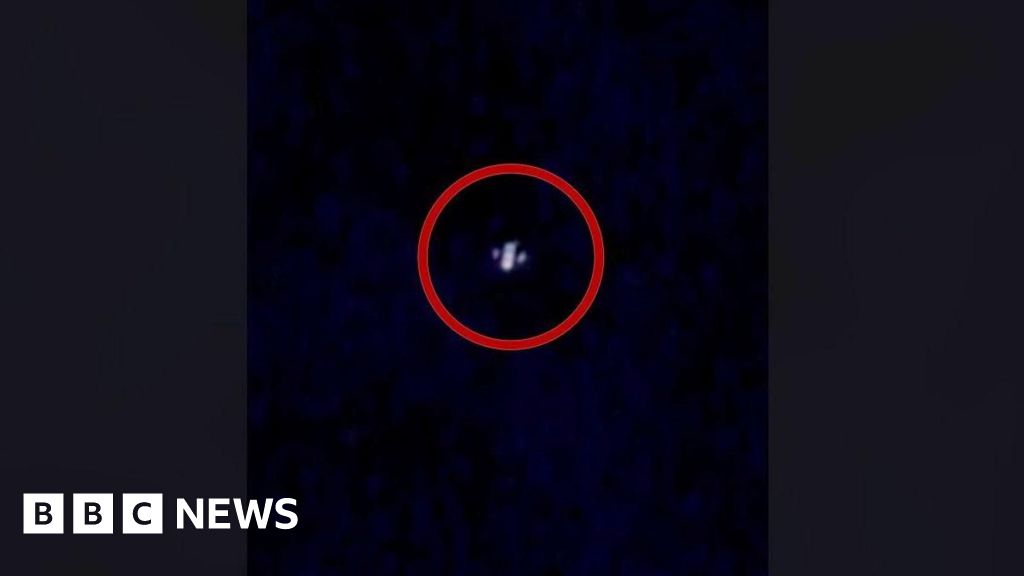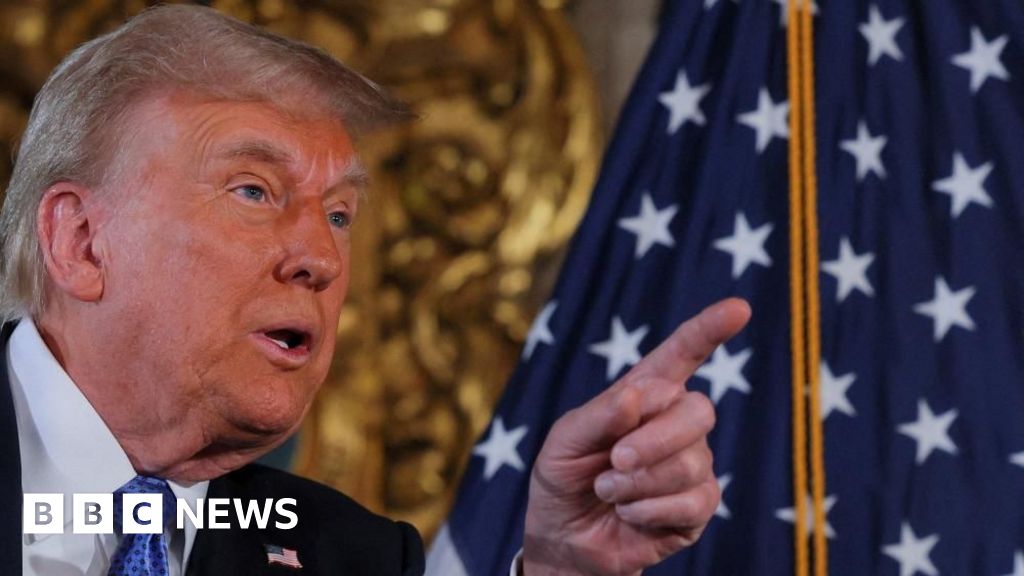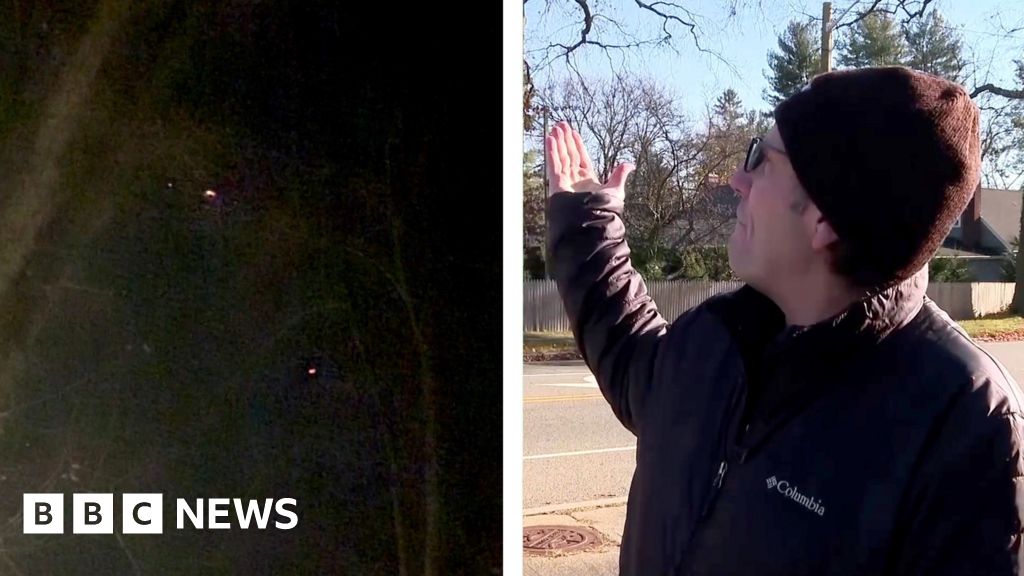ARTICLE AD BOX
By Jon Kelly
BBC News
Image source, Getty Images
She was the toast of high society in London and New York. Now Ghislaine Maxwell has been convicted of grooming and trafficking underage girls. After learning to serve her crooked father's whims, she then did the same for another tyrant, Jeffrey Epstein.
Ghislaine Maxwell was born on Christmas Day 1961. Three days later, a car carrying her 15-year-old brother Michael crashed into a lorry along a foggy Oxfordshire road. Michael Maxwell would spend the remaining seven years of his life in a coma.
Although she had been born into material abundance - her father was the publishing tycoon Robert Maxwell - by every account, Ghislaine Maxwell's earliest years were disfigured by emotional neglect. Betty, her mother, later admitted in her memoir that after Michael's accident the baby "was hardly given a glance" by her devastated parents.
One day in 1965, according to Betty, three-year-old Ghislaine Maxwell stood in front of her and declared: "Mummy, I exist." Betty also believed the toddler developed anorexia. To compensate, from this point both parents went to the opposite extreme and began lavishing affection on their youngest child.
Image source, Shutterstock
Image caption,Robert Maxwell with seven of his nine children. Ghislaine Maxwell is pictured sitting on her mother's knee
Though she was never spared the abuse and the rages her father would inflict on every one of his offspring, she would soon emerge as his favourite. And, Betty would later write in her 1994 memoir, that favourite daughter "became spoiled, the only one of my children I can truly say that about".
Now a New York court has convicted Ghislaine Maxwell of charges so shocking - grooming and sex trafficking girls for abuse by the paedophile financier Jeffrey Epstein - it's tempting to look for an explanation in her dysfunctional childhood.
But just as her crimes are impossible to excuse, Maxwell is a difficult woman to comprehend. For a life lived in public, the fine details of her biography have always been unusually elusive.
Maxwell was raised in Headington Hill Hall, a vast Italianate mansion overlooking Oxford in the UK. Rather than buying it himself, her plutocrat father had somehow persuaded its owner, Oxford City Council, to rent it to him for a minimal sum in return for renovating the property. It was, he said, "the best council house in the country".
Throughout Ghislaine Maxwell's childhood, lavish parties were thrown at Headington Hill Hall, with politicians, celebrities and media grandees in attendance. But after the VIPs had left the building it was a deeply emotionally austere place to grow up.
Robert Maxwell had risen from extreme poverty in a Czechoslovak Jewish settlement - most of his family were murdered in the Holocaust - to become a British Army war hero, then an academic publishing magnate, a Labour MP and eventually owner of the Daily Mirror, one of the UK's biggest-selling newspapers.
As a businessman, he was reviled as a bully. At home, meanwhile, he is depicted in Fall, John Preston's biography, as a "draconian father" who abused his children both physically and verbally.
Image source, Getty Images
Image caption,Robert Maxwell at a party on his yacht with daughter Ghislaine Maxwell and wife Betty, circa 1990
They would be interrogated at the dinner table about geopolitics or their plans for the future and reduced to tears if he considered their answers unsatisfactory. "He would beat us with a belt - girls as well as boys," another of Robert's offspring, Ian, told Preston.
Although his favourite, Ghislaine Maxwell wasn't immune from any of this. But while some of her siblings withdrew or rebelled, she was always anxious to please her father - she told Tatler in 2000 he was an "inspiring" parent - and dedicated herself to keeping him happy. It must have worked, after a fashion - Maxwell Snr later named his private yacht the Lady Ghislaine, rather than after Betty or his three older daughters.
And evidently, he had grand hopes for his youngest daughter - he apparently harboured ambitions of marrying her off to the late John F Kennedy Jnr.
She was educated at Marlborough College and Oxford University, where she studied modern history and languages.
"It was very clear to me even as an undergraduate that she was interested in power and money," says the writer Anna Pasternak, who was a contemporary at Oxford and moved in the same social circles. "She was one of those people at parties who always looked over your shoulder to see if there was somebody more powerful or more interesting while she was air-kissing you."
Rachel Johnson, the UK prime minister's sister and another Oxford contemporary, recently raised eyebrows when she recalled spotting Ghislaine Maxwell across the Balliol junior common room - "a shiny glamazon with naughty eyes holding court astride a table, a high-heeled boot resting on my brother Boris's thigh."
After graduating, Maxwell's father appointed her as a director at Oxford United, the football club he owned and chaired, and also set her up with her own company supplying corporate gifts.
Getty Images
She looked over your shoulder at parties to see if there was somebody more powerful
But in the pages of Tatler or Nigel Dempster's Daily Mail gossip column, where she was now a regular fixture, she was usually described as a "socialite" rather than a businesswoman. She began dating Count Gianfranco Cicogna, an Italian aristocrat.
She also founded a kind of private member's club exclusively for women. Pasternak attended on a few occasions and, while the idea seemed innovative at the time, she considered Maxwell an unlikely feminist champion.
"My recollection is that she was kind of breezily charming to other women, but I don't remember her being a very close friend of another woman," Pasternak says. "I think that women weren't really important to her - only as a means to get to another powerful man."
In January 1991, after her father acquired the struggling New York Daily News, she was dispatched to its headquarters as his representative. It was her point of entry into the social scene of Manhattan.
But in November that year, her world was upended. Her father vanished from the deck of the Lady Ghislaine off the Canary Islands and his body was later found floating in the sea.
Ghislaine Maxwell flew straight to Las Palmas, where the yacht had been taken. By every account, she was inconsolable at the loss of her father. The day after his death, she was deputed to deliver an emotional speech to the world's press, who had gathered at the quayside.
Image source, Getty Images
Image caption,Ghislaine Maxwell, holding a framed photograph of her late father, Jerusalem, Israel, 1991
Soon enough it came out that Robert Maxwell had raided the Mirror Group's pension fund of £440m ($583m) as part of a scheme to artificially inflate the company's share price at the expense of 32,000 of his employees.
Now the Maxwell family and the British government were left to pick up the pieces - the latter eventually paying £100m ($132m) towards a bailout of the fund. In June 1992, two of Robert's sons, Ian and Kevin, were arrested and charged with fraud. They were eventually acquitted in January 1996.
While her father's guilt was obvious to most people, Ghislaine Maxwell continued to defend him. "He wasn't a crook," she told Vanity Fair's Edward Klein in early 1992. "A thief to me is somebody who steals money. Do I think that my father did that? No. I don't know what he did. Obviously, something happened. Did he put it in his own pocket? Did he run off with the money? No. And that's my definition of a crook."
While the rest of her siblings accepted Robert Maxwell's death was either an accident or suicide, his youngest daughter insisted he must have been murdered.
Despite her protests, the fall-out from the Mirror pension scandal made the UK a less than welcoming place for her. In November 1992 it was reported that she had bought a $4,000 (£3,019) one-way Concorde ticket to New York.
In 2005, Harry Mount was feeling lonely in Manhattan. Aged 33, he'd just been appointed as the Daily Telegraph's New York correspondent but, as yet, knew few people in the city. When a friend asked him if he wanted to tag along with him to a party at Ghislaine Maxwell's house, Mount jumped at the chance. She was, after all, well known as a prominent figure in Manhattan society who'd been photographed with Bill Clinton, Donald Trump and even Pope John Paul II.
Among the great and the good of US society, her cut-glass British accent and friendship with Prince Andrew marked her out as an exotic, alluring figure.
When Mount arrived at her five-storey mansion on the Upper East Side, he was astonished when she bounded towards him and began bombarding him with questions. He recalls her listening intently to his replies as though he were the most fascinating person in the world.
"There was no reason why she should have been particularly friendly to me," says Mount, now editor of the Oldie magazine, where he has written about their encounter. "She could well have frozen me out while being perfectly polite."
Mount assumed her effusiveness and charm were by-products of her troubled childhood. "You end up with this mixture of great connections and confidence and you move among the great and the good - but fundamentally, you're not that sure of yourself," he says.
"And people who aren't sure themselves are a bit nicer than those who often are."
It was only later that Mount realised there was something he had missed.
Ghislaine Maxwell had reportedly been left with an £80,000 ($106,000)-a-year income from a trust fund. It should have occurred to him, he later reflected, that this amount wouldn't have been nearly enough to pay for her opulent house. Years later, prosecutors would suggest the property had been funded by Jeffrey Epstein.
At that stage Mount didn't know about her connection to the well-known financier.
But before long Epstein's relationship with Maxwell would be scrutinised by every journalist in the city.
Image source, Reuters
Image caption,Jeffrey Epstein and Ghislaine Maxwell
In 2005, the parents of a 14-year-old girl told police Epstein had molested their daughter, and three years later he received an 18-month prison sentence. After his release, the allegations against him began to snowball. He was accused of running a "vast network" of girls for sex.
He was arrested again in 2019 on charges of sex trafficking and died in his prison cell just over a month later. Inevitably the authorities' focus turned to Maxwell.
Like her father, Epstein was an enormously wealthy man from humble origins - in his case, a working-class neighbourhood in Brooklyn. Also like Robert Maxwell, he would eventually be disgraced and die of an apparent suicide in disputed circumstances.
Ghislaine Maxwell's relationship with Epstein was no doubt mutually beneficial. She could introduce him to her wealthy and powerful friends; he in turn had the capital to fund the kind of lifestyle she had grown up to expect.
During the trial, as well as emphasising the pair's closeness, prosecutors noted that Maxwell "was not a particularly wealthy person when she met Epstein".
Certainly, after she returned to New York in the wake her father's death, it was reported that she was working in real estate and living in a $2,000 ($1,509)-a-month apartment - a decent standard of living by any means, not least when the trust fund was taken into account, but nonetheless somewhat less than she might have been accustomed to.
But the fine details of the relationship are not easy to pin down. When it began, how long it lasted and how exactly it should be characterised were all issues of contention at the trial, which has just concluded.
Four charges in Maxwell's trial related to the period 1994-97, when the indictment stated that she was among Epstein's closest associates and also in an "intimate relationship" with him.
By the 2000s, she was linked with another businessman, Ted Waitt. But it appeared that she carried on working for Epstein. By the time of a 2003 profile, Epstein described Maxwell as his "best friend" and journalist Vicky Ward noted that much of his life appeared to be organised by her. Intimate photos of Maxwell and Epstein together released by prosecutors suggested they had remained close.
In court documents, former employees at the Epstein mansion in Palm Beach described her as the house manager who supervised staff, looked after finances and acted as a social co-ordinator.
A housekeeper testified that Maxwell gave staff a 58-page instruction manual and ordered them to speak only when spoken to, avoiding eye contact with Epstein. It's tempting to conclude that just as Maxwell learned to appease the whims of her capricious, bullying father, she applied those same skills on Epstein.
Whatever the exact nature of their relationship, the prosecution portrayed their closeness as a crucial factor in their pattern of abuse - with Ghislaine Maxwell seeking out and grooming victims for Epstein. And now she has been found guilty offive of six counts - including the most serious charge, that of sex trafficking of a minor.
"Ghislaine controlled the girls," Sarah Ransome, who says she was abused by Epstein, told the BBC's Panorama programme. "She would be the one getting all the girls in check. She knew what Jeffrey liked… this was very much a joint effort."
In the months following Epstein's death, Maxwell went to ground. Newspapers speculated as to her whereabouts. A photograph of her outside a Los Angeles branch of In-N-Out Burger appeared on front pages around the world.
Then, in July 2020, she was arrested at her secluded mansion in the US state of New Hampshire. A few months later, it emerged to general surprise that she had married a tech CEO named Scott Borgerson.
BBC
Ghislaine learned to service her father and then a second monster – that’s her entire life
Maxwell was held at the Metropolitan Detention Centre in Brooklyn. While she waited for her trial to begin, her brother Ian told the BBC's Today programme that she was being held in a 6ft by 9ft (1.8m by 2.7m) cell with a concrete bed.
"She is under 24-hour, around-the-clock surveillance, with 10 cameras, including one that moves and tracks her movement," he said. "She's not allowed to move into the corners of her cell and she's not allowed to be within two and a half feet of the cell door. That is her existence."
It was an ignominious fate for a woman who had spent most of her life surrounded by material riches. It was left to the prosecution to explain why on earth she would commit the crimes that had put her there.
Prosecutors suggested money was an incentive. The journalist John Sweeney, who explored the case in his podcast Hunting Ghislaine and is writing a book about it, suggests a deeper psychological motive was at play.
"You can't understand what happened with Jeffrey Epstein without understanding her relationship with her father," he says. "The truth is that Ghislaine learned to service her father and then had to service a second monster - that's what she's done her entire life."
Another similarity between Robert Maxwell and Jeffrey Epstein is that both escaped a full reckoning for their crimes. And defence lawyers argued Ghislaine Maxwell was a scapegoat for Epstein - the age-old story of a woman taking the blame for the misdeeds of her partner.
But Pasternak dismisses the idea that Maxwell is in any way less culpable than Epstein. "There is absolutely no way that he could have had access to that many young girls, whose lives they've obliterated, without Ghislaine," says the author.
While the trial was under way, Ian Maxwell wrote an article for The Spectator putting across his sister's defence. It began with a reprimand to the media corps.
They'd been pronouncing her name inaccurately, he said. It wasn't "Jizlaine". Instead, he insisted, it was "Giilen".
For anyone following the case, it seemed remarkable that such a basic detail had been so consistently wrong. This was a woman, after all, who had lived her entire life in the news pages and gossip columns.
But as the trial progressed it became apparent that so much that had been assumed about her - her relationship status at any one time, the source of her income, and, quite often, her whereabouts - were likely not as they seemed.
Her crimes surely defy explanation, too. And for all that her rise and fall were conducted in public, Ghislaine Maxwell remains unknowable.

 2 years ago
100
2 years ago
100








 English (US) ·
English (US) ·